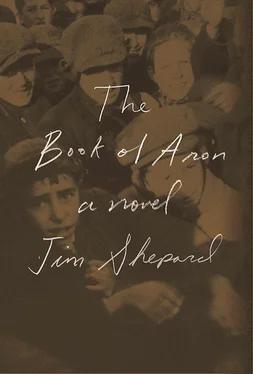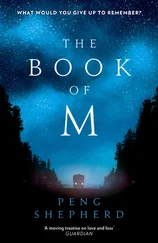That was also the year I first ate in a restaurant. My father took me to celebrate some good fortune he never explained. It was the first time I was able to choose my own food. He quizzed me on Jan Henryk Dąbrowski while I ate since he considered himself an amateur historian. While I was eating dessert he made me laugh by breaking walnuts with his teeth. That night I dreamed that a raven was sitting on my shoulder in the wind and a black cloak was streaming out behind me. When my father was getting dressed the next morning I put my arms around him. “What’s the matter with him today?” he asked my mother before he left.
THE KIDS ON MY BLOCK REACTED TO MY LACK OF interest with their own. Sometimes they threw stones at me. Another whole summer came and went. I wanted to learn how to ride a bicycle, so I went to a boy who owned one and he said he would teach me. I could get on by myself after the first lesson but then he wouldn’t teach me anymore. I met Lutek one evening when I sat near some kids I didn’t know and they told me to leave but I didn’t. He had a rabbit-skin cap with earflaps and when one of the kids asked where he got it he said that he’d found it between the kid’s mother’s legs, so they started pushing him around. They knocked him into me, so I shoved the kid who’d done it and he landed on his back and head on the paving stones. The other kids chased us and Lutek led me into a cellarway hidden by a coal chute and they all ran by. I asked how he’d found it and he said he’d been hiding since before I was born. While we sat there in the dark I asked him more questions but he stopped answering and just sniffed at the air like a dog.
He was even smaller than me. He was so small he said he had a younger sister who everyone thought was older. He said the village he was from was pitiful. It didn’t appear on maps and it was just three lanes of cottages, fences, and mud. He’d gone to school for a year at one at the Talmud-toyres on Miła Street, which he said was famous for graduating ignoramuses. He said his father was the strongest porter in the city and pulled a handcart he harnessed to himself like a horse. He was especially good with the huge machinery crates from Lódz that three men had trouble budging. Otherwise he sat in a tavern. He worked at the railroad station near Jaruszewski’s courtyard. That neighborhood scared me. Smoke from the slag heaps always darkened the air over the loading docks.
My mother was happy I’d made a friend but soon upset that I was never around to watch my younger brother once Lutek took charge of my education. He showed me how to steal from the vegetable carts, and how one of us by making a commotion could hide what the other was doing, even when the peddlers were watching out for one another. With a French pamphlet he took from a bookstall he proved I didn’t know anything about girls, and discovered I knew so little that I didn’t even know what he was talking about. After he had cursed some filthy Russians he also said I didn’t know anything about politics, which was also true.
He taught me that no one else’s problems should get in the way of our having a good time. I told him about all the trouble I’d gotten into with Yudl, including the broken school windows, but he was unimpressed. His family had moved three times since coming to Warsaw and in one neighborhood he’d been hauled in by the police for breaking down the door of a boy who’d stolen his cap, and in another for having put a hole in a kid’s head with a jeweler’s hammer. He said the kid was okay after a while, though he’d had to wear a head-bandage and everyone had called him the Sheik.
I asked if his father beat him for such offenses and he said he’d had more luck with his father’s strap since he’d learned to rub garlic and onion onto the welts. And that he was lucky that his father was more upset about his sister’s stutter. His father tried to cure it by mimicking her, to shame her into getting over it. She liked me because when I had to wait for her to finish what she was saying I never got impatient. She told Lutek that I was kind and he should bring me around more often, so he had me talk to her while he slipped money from her secret hiding-spot. He said she knew he stole from her but she never complained about it. When he took enough we would buy sausages and ride the trolley.
ON THOSE DAYS I WAS AROUND AND MY YOUNGER brother was feeling better my mother ordered me to take him to the park so he could get some fresh air. He was always thrilled to go. The back courtyard with the garbage bins got no light and was deserted except for the occasional stray cat. Lutek always found us wherever we went. He said that being saddled with a consumptive wasn’t the end of the world and we could always find some uses for him, so one day we persuaded him to steal a jar of jam and on another to sing to a policeman. Or else we went about our business and he followed along. Whenever Lutek saw his blank look he asked him, “So how’s the weather in Wilno?” a joke my younger brother never understood.
On our way home I told him not to tell our mother about whatever we had done, and then she said he had to, and so he did, and I wouldn’t get supper that night. Then after he went to sleep she would sit at the foot of my bed and we’d look at each other. Neither of us would speak until she finally asked me to try to remain a decent human being and then kissed my cheek before wishing me a good night. And I would look up at my ceiling in the darkness and remember that I gave her nothing in return for what she gave me, and almost never had. Then I would plan my next day with Lutek.
SHE GAVE ME A PARTY FOR MY NINTH BIRTHDAY. THE day after the party Lutek’s sister asked how it had been, and he said what was there to tell about it. We had raisin cake and the guests were my younger brother and Lutek. My younger brother gave me a book of his drawings and my mother sewed me a leather satchel.
That whole winter my younger brother’s health improved until it got worse and he had to go to the hospital. Before he got sick my mother had pneumonia and took to her bed for a week, and he spent the whole time on the end of her blanket, staring. When she woke up she would ask me to get him a sweater and I’d ask if he was cold and he would say no. He was starting to cough too, and she finally got out of bed to drape a muffler around his neck. Then after she said she was feeling better he got so excited he ran around the back courtyard in a rainstorm and came in soaked and shaking.
For a while she tried to take care of him herself at home. She had me read to him in the afternoons, and he always chose a book called Jur about two brothers, one sickly and in constant need of looking after and the other a picture of health who ended up dying. My younger brother always liked the end in particular, when the sickly brother stood over the healthy brother’s grave and talked about how much he missed him.
Finally it turned out that he had pneumonia too and had to go to the hospital. By then he had to be carried through the streets in an ambulance.
My mother and I sat with him when we could. My older brothers and father visited once, all together. They brought him a big tin of sweets that they opened and sampled.
He hated being left at the hospital at night and screamed at our leaving. My mother always wept all the way home. After three days his fever was so high he didn’t recognize us. The nurses brought him compresses but he was so hot they couldn’t keep them cold. They brought him bread soaked in milk and we helped him open his mouth to eat it.
The day he died I told him that he was acting like an older boy, being brave. My mother had brought him home and he said he wished he could buy me the tailor shop’s miniature uniform of the Uhlans Regiment, which was my favorite. My mother was at the pharmacy and he asked when she was coming back. He said she’d been telling him how much better he was getting, but that now she sounded less sure. He breathed like someone was sitting on his chest, and it was hard for him to say even that much.
Читать дальше












